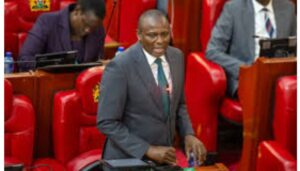If Parliament was functiong, Ruto wouldn’t be in office – David Maraga

Former Chief Justice David Maraga hit out at Parliament over its failure to impeach President William Ruto.
Former Chief Justice David Maraga hit out at Parliament over its failure to impeach President William Ruto.
While speaking on Citizen TV on Tuesday, July 15, Maraga noted that, given the clamour to have Ruto leave office before the 2027 elections, Parliament should have already kick-started the process of impeaching the Head of State.
Maraga, who is aiming to unseat Ruto in the upcoming polls, further accused the legislative arm of government of being under Ruto’s control, noting that this was why no progress was being made on ousting Ruto from office.
“Parliament has the power to impeach the President. He has violated countless provisions of the Constitution,” Maraga stated.
“If Parliament were doing its work, the President would not be in office today,” the CJ Emeritus added.
Maraga noted that aside from Ruto himself resigning from office, an impeachment by Parliament was the only other legal way that the President could exit office before the end of his first term.
“What people are saying when they are talking about ‘Wantam’ is that President Ruto to resign. If you are not resigning Parliament, are you listening? Impeach this President and get him out,” Maraga posited.
In Kenya, a motion of impeachment against the President can be moved on grounds of gross violation of a provision of the Constitution or any other law, serious reasons to believe that the President has committed a crime under national or international law, or on the ground of gross misconduct.
The process itself is a two-stage process involving the National Assembly and the Senate, as outlined in Article 145 of the Constitution of Kenya, 2010.
A Member of the National Assembly (MP) who intends to move a motion for impeachment must submit a copy of the proposed motion to the Clerk of the National Assembly. The proposed motion must state the grounds and particulars of the allegations.
It must be supported by at least one-third (1/3) of all the members of the National Assembly (i.e., at least 117 out of 349 members). The MPs supporting the motion must sign it.
Once officially submitted and approved by the Speaker, the motion is debated, setting the stage for a pivotal vote within seven days.
Should the National Assembly vote to support the impeachment motion, it must garner the endorsement of a formidable two-thirds majority of its members.
Kenya among first African countries to roll out HIV prevention injection
ORPP appoints Sophia Sitati as acting Registrar of Political Parties
I have no regrets making difficult decisions for Kenya; President Ruto
Mysterious disease with boil-like sores, peeling skin kills 4 in Mombasa
HELB issues loan repayment directive
Son of DCI officer killed during Saba Saba protests
If successful, the Speaker of the National Assembly promptly informs the Speaker of the Senate, signalling the transfer of proceedings to the upper house. Crucially, during this transition, the President retains all official functions, ensuring continuity of government until a final determination is reached.
Within seven days of receiving the National Assembly’s resolution, the Senate convenes to address the charges. The Senate has the option to appoint a special committee of eleven of its members to delve into the allegations.
This committee, tasked with a thorough investigation, must report back to the full Senate within ten days, stating whether the particulars of the allegations against the President have been substantiated.
Throughout this investigative phase, the President is afforded the fundamental right to appear before the committee, either in person or represented by legal counsel, to present their defence. This is akin to what happened with former Deputy President Rigathi Gachagua during his impeachment.
If the special committee finds any of the allegations substantiated, or if the Senate chooses to hear the matter directly, a vote is taken on each impeachment charge.
A President can then be impeached if at least two-thirds of the senators vote to uphold any single impeachment charge.
Ruto has, however, maintained that he will be on the ballot in the upcoming elections, terming attempts to prematurely oust him from office as threats to the nation’s security and political stability.
Three KDF soldiers killed, 7 injured in Lamu IED explosion
Foreign Embassies issue statement after appointment of IEBC commissioners
Ndindi Nyoro alleges government took secret loan using fuel levy as security
Gloria Orwoba ordered to pay Senate clerk Ksh10.5 million in defamation case
Late, absent civil servants to be treated as ghost workers; Public Service CS
Follow us






